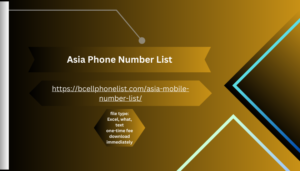Post by account_disabled on Mar 11, 2024 1:01:06 GMT -6
Education transforming traditional learning environments into immersive and interactive experiences. This article explores the definition of VR in education and delves into its profound significance in reshaping the landscape of learning. Immersive Learning Experiences VR facilitates immersive learning experiences by creating virtual classrooms enabling virtual field trips and simulations and offering handson training in a simulated environment. This section highlights how VR immerses students in educational content making learning more engaging and practical. The immersive nature of VR enhances student engagement and improves information.
The retention. Increased interactivity coupled with personalized learning paths within virtual environments contributes to a more effective and tailored educational experience. Accessibility and Inclusivity VR in education breaks geographical barriers providing learning opportunities to students regardless of their Asia Phone Number List location. Additionally it caters to diverse learning styles and adapts to different needs fostering inclusivity within educational settings. Realworld Applications This section explores the realworld applications of VR across various subjects. From using VR for interactive learning in science and mathematics to historical and cultural immersion experiences and even professional skills development the applications of VR in education are diverse and impactful.

Overcoming Challenges While VR holds immense potential there are challenges to overcome. Initial implementation costs technical requirements and ensuring equal access to VR education are discussed along with potential solutions to make VR education more accessible. Future Trends Anticipating future trends is crucial for educators and institutions. Advancements in VR technology potential integration with Augmented Reality AR and the prospect of collaborations and partnerships in the VR education space are explored offering insights into the evolving landscape. Benefits for Educators Educators benefit from VR by facilitating interactive teaching methods gaining indepth insights into student progress and having opportunities for professional development within VR environments.
The retention. Increased interactivity coupled with personalized learning paths within virtual environments contributes to a more effective and tailored educational experience. Accessibility and Inclusivity VR in education breaks geographical barriers providing learning opportunities to students regardless of their Asia Phone Number List location. Additionally it caters to diverse learning styles and adapts to different needs fostering inclusivity within educational settings. Realworld Applications This section explores the realworld applications of VR across various subjects. From using VR for interactive learning in science and mathematics to historical and cultural immersion experiences and even professional skills development the applications of VR in education are diverse and impactful.

Overcoming Challenges While VR holds immense potential there are challenges to overcome. Initial implementation costs technical requirements and ensuring equal access to VR education are discussed along with potential solutions to make VR education more accessible. Future Trends Anticipating future trends is crucial for educators and institutions. Advancements in VR technology potential integration with Augmented Reality AR and the prospect of collaborations and partnerships in the VR education space are explored offering insights into the evolving landscape. Benefits for Educators Educators benefit from VR by facilitating interactive teaching methods gaining indepth insights into student progress and having opportunities for professional development within VR environments.
